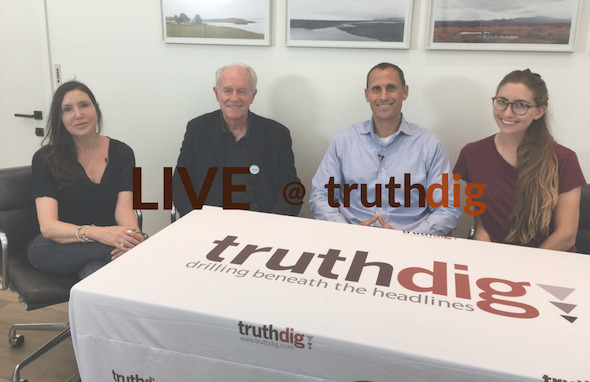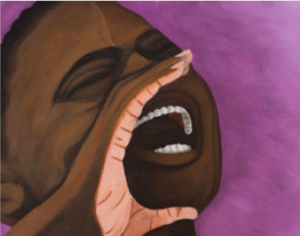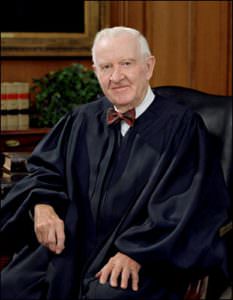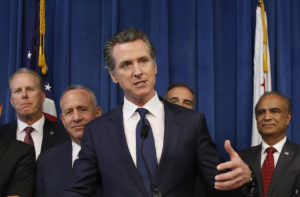The Future of the Death Penalty in the United States
On Thursday the Truthdig team sat down with Mike Farrell, acclaimed actor, activist and anti-death penalty advocate.
From left: Zuade Kaufman, Mike Farrell, Eric Ortiz and Emma Niles.
Most of the nation is focused on the presidential campaign, but for California residents there is a multitude of issues that also warrant serious consideration on Election Day. This November, Californians will get the chance to vote on not one, but two measures involving the death penalty.
On Thursday, Oct. 6, the Truthdig team sat down with special guest Mike Farrell to discuss these very questions on “Live at Truthdig.” Farrell, an American actor who starred on the television series “M.A.S.H.” and has a long history of working for politically progressive causes, is particularly passionate about abolishing the death penalty. He is currently the president of Death Penalty Focus, California’s most prominent anti-capital punishment organization. Farrell also has written of the brutality of capital punishment in California for Truthdig in the past.
If successful, Proposition 62 would eliminate capital punishment in the state — but Proposition 66, also on the ballot, would shorten the process of appeals in death penalty cases. Truthdig contributor Marjorie Cohn writes:
Whereas Proposition 62 would replace the death penalty with life in prison without parole, Proposition 66—the Death Penalty Reform and Savings Act—purports to execute Californians more efficiently. The latter initiative would double down on the death penalty and spread the costs and burdens to local courts and counties.
Under the guise of efficiency, Proposition 66 would add two additional layers of habeas corpus review in superior and appellate courts. It would impose unworkable time frames for appeals and habeas proceedings. And it would require attorneys who may be inexperienced, unqualified or unwilling to take death penalty cases or face expulsion from the court’s public defender panel.
These ballot measures are reflective of changes occurring across the nation. In August, the Delaware Supreme Court struck down that state’s use of capital punishment. Nebraska has a November referendum that could overturn the state’s 2015 ruling that the death penalty was unconstitutional. And many other states throughout the U.S. are in similar legal and judicial battles over keeping or abolishing the death penalty.
Activists against the death penalty have a long list of reasons for overturning capital punishment. There are, they argue, strong economic, moral and legal reasons to abolish the death penalty. However, advocates of the use of capital punishment have their own reasons for wanting to keep it around. In a 2014 poll of Americans who favor the death penalty in murder convictions, a majority cite a moral justification: “An eye for an eye.” Only 4 percent of Americans who favor the death penalty answered that they do so because it “serves justice.”
Nationwide support for the death penalty continues to fall. And yet, “[o]nly China, Iran, Iraq and Saudi Arabia execute more people than the United States,” Cohn notes in her piece. What does this say about the United States? How have attitudes for and against capital punishment evolved over the years? Is the death penalty indeed necessary?
While Farrell acknowledges the economic and judicial support for repeal of capital punishment, he also focuses on a bigger issue. “Grave damage is being done to our moral authority,” he said in an interview with the Monterey Herald. “I absolutely agree that some people need to be taken off the streets. But when people say, ‘They deserve to die,’ I say, ‘We don’t deserve to kill them.”
Farrell recently spoke with Truthdig Editor in Chief Robert Scheer about what it would take to abolish the death penalty nationwide. Farrell spoke about the historical changes that led many politicians to support capital punishment. “The more I got involved and the more I learned about it, the more I saw how politically involved this thing was,” he told Scheer. “It was the political third rail. No politician after the Nixon-Agnew years would say, ‘I was against the death penalty,’ because they replaced ‘soft on communism’ with ‘soft on crime.’ “
Farrell also elaborated on his moral reasons for opposing the death penalty, including the underexamined social implications of the issue:
There are four hypotheses I have put out, which are that any human being, every human being, has intrinsic value, no matter what he or she does. No one is only the worst thing he or she has ever done. There is always a reason for human behavior, and the state killing lowers the entire community to the level of its least member at his or her worst moment. We just have to understand; it’s not like there’s some other out there who does terrible things. This bad-seed notion makes me ill—that people behave sometimes terribly, but if you look at the background, you’d understand that there’s a reason for their behaving terribly and that there’s a reason that society fails to not recognize how to deal with the circumstances of these lives, rather than simply terminating the individual because of his or her inability to behave in what we deem to be an appropriate manner.
You can watch this interview with Farrell here and past editions of “Live at Truthdig” here.
—Posted by Emma Niles
Independent journalism is under threat and overshadowed by heavily funded mainstream media.
You can help level the playing field. Become a member.
Your tax-deductible contribution keeps us digging beneath the headlines to give you thought-provoking, investigative reporting and analysis that unearths what's really happening- without compromise.
Give today to support our courageous, independent journalists.





